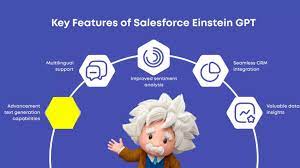Artificial intelligence (AI) has been rapidly advancing globally, with breakthroughs captivating professionals across various sectors. One milestone that has gained significant attention is the emergence of ChatGPT, a cutting-edge language model revolutionizing the tech landscape. This development has profoundly impacted businesses relying on Salesforce for their customer relationship management (CRM) needs. In March 2023, Salesforce unveiled its latest AI innovation, Einstein GPT, promising to transform how companies engage with their clientele. In this article, we explore what Salesforce Einstein GPT entails and how it can benefit teams across diverse industries.
When OpenAI introduced ChatGPT in November 2022, they didn’t expect the overwhelming response it received. Initially positioned as a “research preview,” this AI chatbot aimed to refine existing technology while soliciting feedback from users. However, ChatGPT quickly became a viral sensation, surpassing OpenAI’s expectations and prompting them to adapt to its newfound popularity.
Developed on the foundation of the GPT-3.5 language model, ChatGPT was specifically tailored to facilitate engaging and accessible conversations, distinguishing it from its predecessors. Its launch attracted a diverse user base keen to explore its capabilities, prompting OpenAI to prioritize addressing potential misuse and enhancing its safety features.
As ChatGPT gained traction, it caught the attention of Salesforce, a leading CRM provider. In March 2023, Salesforce unveiled Einstein GPT, its own AI innovation, poised to transform customer engagement. Built on the GPT-3 architecture and seamlessly integrated into Salesforce Clouds, Einstein GPT promised to revolutionize how businesses interact with their clientele.
Einstein GPT boasts a range of features designed to personalize customer experiences and streamline workflows. From generating natural language responses to crafting personalized content and automating tasks, Einstein GPT offers versatility and value across industries.
By leveraging both Einstein AI and GPT technology, businesses can unlock unprecedented efficiency and deliver superior customer experiences. Despite its success, OpenAI acknowledges the need for ongoing refinement and vigilance, emphasizing the importance of responsible deployment and transparency in the development of AI technology.
Exploring Einstein GPT
Salesforce presents Einstein GPT as the premier generative AI tool for CRM worldwide. Utilizing the advanced GPT-3 architecture, Einstein GPT seamlessly integrates into all Salesforce Clouds, including Tableau, MuleSoft, and Slack. This groundbreaking technology empowers users to generate natural language responses to customer inquiries, craft personalized content, and compose entire email messages on behalf of sales personnel. With its high degree of customization, Einstein GPT can be finely tuned to meet the specific needs of various industries, use cases, and customer requirements, delivering significant value to businesses of all sizes and sectors.
Objectives of Salesforce AI Einstein GPT
Salesforce AI Einstein GPT is designed to achieve several key objectives:
- Enable businesses leveraging Salesforce CRM to provide personalized experiences to their clientele.
- Enhance team productivity by streamlining tasks and processes.
- Improve the overall customer experience through tailored predictions and content.
- Facilitate intelligent, automated, and personalized interactions with customers.
- Support informed decision-making across the organization by offering automated insights using Salesforce data analytics products such as Tableau.
Distinguishing Einstein GPT from Einstein AI
Einstein GPT represents the latest evolution of Salesforce’s Einstein artificial intelligence technology. Unlike its predecessors, Einstein GPT integrates proprietary Einstein AI models with ChatGPT and other leading large language models. This integration enables users to interact with CRM data using natural language prompts, resulting in highly personalized, AI-generated content and triggering powerful automations that enhance workflows and productivity. By leveraging both Einstein AI and GPT technology, businesses can achieve unparalleled efficiency and deliver exceptional customer experiences.
Features of Einstein GPT in Salesforce CRM
Key features and capabilities of Salesforce Einstein chatbot GPT include:
- Generation of personalized content across all Salesforce cloud services, enhancing both employee productivity and customer experiences.
- High customization and extensibility, supporting both public and private AI models tailored for CRM and trained on real-time data.
- Integration with OpenAI, providing advanced generative AI capabilities to users.
- The ChatGPT app for Slack, offering instant conversation summaries, research tools, and writing assistance.
Utilizing Einstein GPT for Business Improvement
Einstein GPT can be leveraged across various domains to enhance business operations:
- Sales teams can benefit from smarter selling and accelerated deal closures through automated and personalized sales tasks.
- Service teams can achieve higher productivity and customer satisfaction by generating personalized chat replies.
- Marketing teams can improve efficiency by generating targeted content and automating campaigns.
- Commerce teams can drive business growth with intelligent product recommendations and personalized search results.
- Developers can receive support through code generation and language assistance.
Integration with Salesforce Data Cloud
Salesforce Data Cloud, a cloud-based data management system, enables real-time data aggregation from diverse sources. Einstein GPT utilizes unified customer data profiles from the Salesforce Data Cloud to personalize interactions throughout the customer journey.
OpenAI on ChatGPT
Methods
We trained this model using Reinforcement Learning from Human Feedback (RLHF), using the same methods as InstructGPT, but with slight differences in the data collection setup. We trained an initial model using supervised fine-tuning: human AI trainers provided conversations in which they played both sides—the user and an AI assistant. We gave the trainers access to model-written suggestions to help them compose their responses. We mixed this new dialogue dataset with the InstructGPT dataset, which we transformed into a dialogue format.
To create a reward model for reinforcement learning, we needed to collect comparison data, which consisted of two or more model responses ranked by quality. To collect this data, we took conversations that AI trainers had with the chatbot. We randomly selected a model-written message, sampled several alternative completions, and had AI trainers rank them. Using these reward models, we can fine-tune the model using Proximal Policy Optimization. We performed several iterations of this process.
ChatGPT is fine-tuned from a model in the GPT-3.5 series, which finished training in early 2022. You can learn more about the 3.5 series here. ChatGPT and GPT-3.5 were trained on an Azure AI supercomputing infrastructure.
Limitations
- ChatGPT sometimes writes plausible-sounding but incorrect or nonsensical answers. Fixing this issue is challenging, as: (1) during RL training, there’s currently no source of truth; (2) training the model to be more cautious causes it to decline questions that it can answer correctly; and (3) supervised training misleads the model because the ideal answer depends on what the model knows, rather than what the human demonstrator knows.
- ChatGPT is sensitive to tweaks to the input phrasing or attempting the same prompt multiple times. For example, given one phrasing of a question, the model can claim to not know the answer, but given a slight rephrase, can answer correctly. Or make something up.
- The model is often excessively verbose and overuses certain phrases, such as restating that it’s a language model trained by OpenAI. These issues arise from biases in the training data (trainers prefer longer answers that look more comprehensive) and well-known over-optimization issues.
- Ideally, the model would ask clarifying questions when the user provided an ambiguous query. Instead, theirr current models usually guess what the user intended.
- While OpenAI has made efforts to make the model refuse inappropriate requests, it will sometimes respond to harmful instructions or exhibit biased behavior. We’re using the Moderation API to warn or block certain types of unsafe content, but we expect it to have some false negatives and positives for now. We’re eager to collect user feedback to aid our ongoing work to improve this system.
ChatGPT and Einstein GPT
Salesforce Einstein GPT signifies a significant advancement in AI technology, empowering businesses to deliver tailored customer experiences and streamline operations. With its integration into Salesforce CRM and other platforms, Einstein GPT offers unprecedented capabilities for personalized engagement and automated insights, ensuring organizations remain competitive in today’s dynamic market landscape.
When OpenAI quietly launched ChatGPT in late November 2022, the San Francisco-based AI company didn’t anticipate the viral sensation it would become. Initially viewed as a “research preview,” it was meant to showcase a refined version of existing technology while gathering feedback from the public to address its flaws. However, the overwhelming success of ChatGPT caught OpenAI off guard, leading to a scramble to capitalize on its newfound popularity.
ChatGPT, based on the GPT-3.5 language model, was fine-tuned to be more conversational and accessible, setting it apart from previous iterations. Its release marked a significant milestone, attracting millions of users eager to test its capabilities. OpenAI quickly realized the need to address potential misuse and improve the model’s safety features.
Since its launch, ChatGPT has undergone several updates, including the implementation of adversarial training to prevent users from exploiting it (known as “jailbreaking”). This technique involves pitting multiple chatbots against each other to identify and neutralize malicious behavior. Additionally, OpenAI has entered into lucrative partnerships with Microsoft and Bain, further solidifying ChatGPT’s position as a leading AI application.
Despite its success, ChatGPT’s rapid rise has brought new challenges, particularly in terms of safety and ethical use. OpenAI continues to monitor its performance closely, actively addressing issues as they arise and striving to enhance the model’s capabilities while ensuring responsible deployment.
Looking ahead, OpenAI acknowledges that there is still much work to be done. While ChatGPT represents a significant advancement in AI technology, it is by no means a finished product. The team remains committed to transparency and managing expectations, emphasizing that language models are still in the early stages of development, with many challenges yet to be overcome.
Content updated March 2023.












